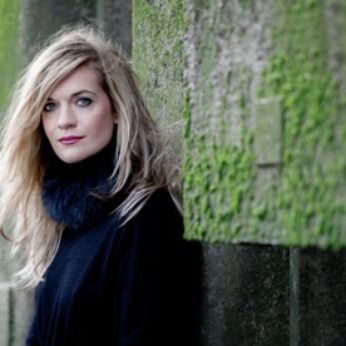Composer: Benjamin Britten (b. 1913 - d. 1976)
Performance date: 04/07/2012
Venue: St. Brendan’s Church
Composition Year: 1941 - 1961
Duration: 00:11:50
Recording Engineer: Anton Timoney, RTÉ lyric fm
Instrumentation: S-solo, pf
Instrumentation Category:Duo
Artists:
Ruby Hughes -
[mezzo-soprano]
Julius Drake -
[piano]

The outbreak of the Second World War found Britten and
Peter Pears in the
no plans to return to
The American musical world was lionising him and he had a number of commissions
– Les Illuminations, Sinfonia da Requiem,
Paul Bunyan and several other works. Early in 1941 Britten saw an article
by E.M.Forster on George Crabbe and his
poem, Peter Grimes. The article began
with the words – To talk about Crabbe is to talk about
and it went on to describe the
countryside that Britten knew so well. Then in the following autumn Britten
found himself with a total compositional block and, at that point, reached the
decision to return to his homeland. It was during this depressing time of
waiting – first for an exit visa, later for a ship – that Britten first turned
to arranging folksongs, a relatively straightforward task that provided useful
repertoire for his recitals with Peter Pears and as a way of breaking through
his creative block. Four of his earliest arrangements including Oliver Cromwell were performed in
November 1941.
It was no accident that he chose folksongs of British
origin. He had worked with French texts for Les
Illuminations, with Italian texts for the Michelangelo Sonnets and finally on an American theme with Paul Bunyan. Now by turning to
quintessentially English music he was finally preparing to return home and the
setting of works like Serenade, Peter
Grimes and The Holy Sonnets of John
Donne. Later he made arrangements of eight French folksongs for Sophie Wyss
and five more volumes of folksongs followed over the years, including a volume
based on
Irish Melodies from which The last rose
of summer is taken.
Britten and Pears used them to round off a recital in
a light, if not always light-hearted, manner and of course they made excellent
encores. They should not be under-estimated, the piano parts in particular are
a delight. The closing lines of the children’s song Oliver Cromwell make a particularly apt conclusion to a recital:
If you want any more you can sing it yourself
Hee haw sing it youself.
Copyright © 2025 West Cork Music. All rights reserved.
Designed and developed by Matrix Internet